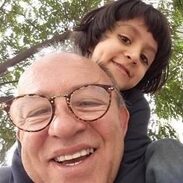 My mother is Japanese and my father is Jewish. Both me and my father were born and raised in Chicago and the city is very much part of our social identities. I have spent most of the last few years in Washington DC., New York City, and Boston, however, and I am now in the process of moving back home to Chicago. I have been working very hard this summer to prepare myself for graduate school in Psychology by studying at the University of XXXX in XXXX, completing an Introduction to Psychology intensive course and currently enrolled in “Research Methods in Psychology.”
My mother is Japanese and my father is Jewish. Both me and my father were born and raised in Chicago and the city is very much part of our social identities. I have spent most of the last few years in Washington DC., New York City, and Boston, however, and I am now in the process of moving back home to Chicago. I have been working very hard this summer to prepare myself for graduate school in Psychology by studying at the University of XXXX in XXXX, completing an Introduction to Psychology intensive course and currently enrolled in “Research Methods in Psychology.”
I hope to earn the PsyD Degree in Clinical Psychology and develop a central focus on psychotherapy and psychoanalysis. XXXX is my first choice because I see your program as the most innovative and thoroughgoing among programs in Chicago and the best fit for my intellectual and professional interests. In particular, I appreciate your emphasis on the “practitioner-scholar” model of training.
I seek a total immersion as a doctoral student in the study of primary social forces and subject positioning. What does it mean to say that we have inner lives? Is this fantasy, metaphor, or allegory? Drawing critically on the traditions of post-structuralism and post-modernism, I want to engage with these questions. I am intrigued by the pervasiveness of complexity, ambiguity and uncertainty surrounding meaning making endeavors, especially for people struggling through difficult situations – particularly in light of the psychological, social and cultural applications of psychoanalytic theory.
I am especially interested in issues of gender and identity and their relationship to the development of one’s social life, and to questions of otherness, marginalization, and oppression. Looking forward to an in-depth study of how identities, beliefs, intimacies and hatreds are transmitted across generations as well as between contemporaries, I am especially interested in secrets that are passed down from one generation to the next, the pull of the past. Processes of change occurring at personal, microsocial and macrosocial levels will be my central focus as I examine the psychological investments made in both change and resistance to change. Looking in broad strokes at strategies of empowerment and liberation, I want to think with increasing creativity about what opposes the march towards freedom and realization.
I plan to devote my professional life to the study of why so many people tend to remain in love with their chains. This entails raising many conventional and fundamental questions with respect to both psychotherapy and social action. The psychosocial project is complicated by the fact that psychotherapeutic practices are by no means uniformly progressive in their politics or in their effects. Indeed, much commentary on psychotherapy - from feminism to critical theory - has been directed at the conformism embedded in its assumptions and practices: adaptational, elitist, ideological, controlling, patriarchal, bourgeois, etc. Clearly, psychotherapy is embedded within some form of modernist epistemology which assumes the possibility of expertise, integration and individual self-development, and which often brackets out the “social” aspect of the psychosocial subject. I have no commitment to any particular way of doing psychotherapy--or even to psychotherapy as a basic good, which it might or might not be; rather, I am interested in questions of social and personal change, independently of the extent to which that change has occurred as a result of therapy. As a practitioner-scholar, I am fascinated by historical and area studies that shed light on the social psychological aspects of social change, the examination of shifts in action and experience over time and place so as to learn as much as possible about the mechanisms that inhibit or facilitate progressive adaptation to one’s social environment.
My intention in undertaking research at the doctoral level is to further my personal understanding of the dissonance between my own inter-subjective experience of reality and the objective one in which I struggle daily. I do this with the hope that in doing so I may discover something which will help to further the self-understanding of others as well. I want to contribute to the actualization of one potential over another and in this way promote a social order characterized by greater levels of freedom and more equitable relationships among people. I do not believe that we should try and create such relationships by force, or, its correlate, control, but through empowerment and participation grounded in principles of justice and human dignity. I hope to become a “good-enough” (to use Winnicott’s term) psychotherapist to be able to provide someone with the opportunity to seize hold of lost or hidden meanings and re-own them, recover them; empowered to tell their own stories and reflect back in a way that enables these life-stories to be owned, understood, and put to the service of one’s liberation.
I am committed to psychoanalysis on both professional and personal levels, seeing my own analyst for the past 4 years, completing courses in psychoanalysis and reading a lot of the major texts, Freud and Jung, object relational theorists such as Winnicott, Klein, Segal, Fairbain, Bion, Kohut, etc. To be committed to psychoanalysis, for me, implies putting the insights and forms of attention learned in the clinic (or elsewhere) to the test in everyday life.
I measure success in life by its level of passionate fullness; by one’s ability to bear tension, frustration, and anxiety; by felicitous reflection on and the ability to work towards the attainment of various and varied desires; by the well-cultivated capacity to receive and respond to our desires and meanings as well as those of others. I also see this as the ultimate measure and meaning of one’s commitment to psychoanalysis.
I would like to eventually have my own private practice providing psychoanalytic psychotherapy to clients from diverse backgrounds and helping as many people as I can. I also hope to secure a position teaching, continuing my research and writing/publishing in my areas of interest. I have worked hard to enhance my capacities to tolerate, reflect, and work within the space of ambiguity and tension through self-observation and integration of overwhelming affects, fears, desires, anxieties, and sensations. My research interests and the work that I want to pursue provide me a sense of personal vitality and authenticity and for this reason I will work as hard as I can to fulfill my passion. I feel especially attracted to the research undertaken by Dr. XXXX at XXXX and I believe my research interests are such that he would be a good fit for me as a mentor to guide me with respect to directions in my research.
I earned college credit from Columbia University and New York University in the summers of 2003 and 2004. I graduated cum laude from the XXXX University in 2006 and was on the Dean's List at GWU for two semesters (fall 2004, fall 2005). I was also awarded a place in the National Society of Collegiate Scholars at GWU (fall 2003). I also completed a Graduate-Student-at-Large program at the University of XXXX and took courses from the Committee on Social Thought and Philosophy (2007-2008). I have traveled much of the world, spending a full year traveling through India and Asia (Tibet, Burma, Bhutan) after I graduated from college. I have been to China several times (Hong Kong, Beijing, Shanghai, Taishan), Tokyo, Taipei, Bali, Indonesia, Western Europe (I lived in Paris for 6 months). My parents moved to Milan, Italy for one year when I was 12 for their work as fashion designers. Thus, I was able to see much of Italy. I have also been to Cape Town, South Africa as well as Kenya and Tanzania. In Latin America I have visited Argentina, Chile, Peru, Cuba, and in the Middle East Dubai. I read and speak French at an intermediate level and I Spanish as a beginner.
Very much influenced by humanism, critical theory, Gramsci, Foucault, and a variety of feminist perspectives, I have drawn from these individuals and theories because they struck a cord that resonated through the whole of my personal and intellectual search for self-understanding and direction. They gave voice to and expanded the personal knowledge that I brought to my efforts to reflect on and make sense out of my own experience.
Schultz's concept of phenomenology, for example, speaks to my belief that all knowledge is relative and normative; that empirical facts and data are meaningful only when they are placed in a normative and value-laden context; and, that "into every act of knowing there enters a passionate construction of the person knowing what is being known and…this coefficient is no mere imperfection but a vital component of [her] knowledge" (Polanyi, 1958). The Freirean philosophy of consciousness and empowerment, as well as humanism, speaks to my need to believe that collectively and individually we can freely choose the values and assumptions from which we name reality.
Gramsci and Foucault, in different ways, give voice to my understanding of the intensity of the struggle in which we must engage, both collectively and individually, in order to be able to make the choices that lead to our fullest self-realization. Finally feminism addresses most directly my own experience of oppression as a woman.
I thank you for considering my application to XXXX.


